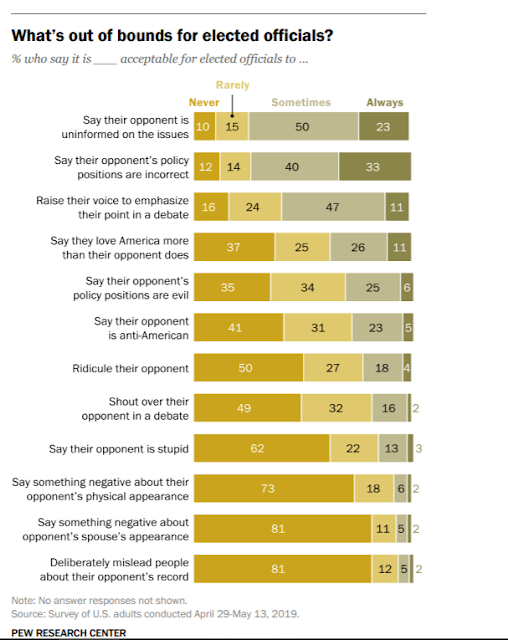First, the small print: the survey was conducted April 29 - May 13, and 10,170 respondents out of 13,476 members of the Pew American Trends Panel responded. The survey is conducted online, either via a panelist's own Internet hookup, or via tablet and wireless internet device provided to those who don't have Internet access of their own.
Among the highlights:
- while 55% say president Trump has made the tone and nature of political debate worse, almost inconceivably, 24% say he's made it better. Another 20% think he's not had much of an impact.
- On an emotional, gut-reaction level, the president's comments generate strong reactions. 76% say he makes them feel concerned, 70% say confused, 69% are embarrassed, and 67% are exhausted.
The feelings about how Trump has changed things is pretty consistent across various demographics, except party affiliation, of course. People in all age brackets and levels of education are united in the belief that he has made things worse.
And even on the right side of the equation, only those identifying as 'conservative' disagree.
And even on the right side of the equation, only those identifying as 'conservative' disagree.
Thinking about the state of political debate overall, things are not all that great. For example,
- 85% think it's more negative;
- 85% think it's less respectful;
- 76% think it's less fact-based;
- 60% think it's less issues-focused, but 20% think it's gotten more focused on issues, which is kind of a headscratcher.
Party differences are wider, though, when it comes to who people think can speak freely. Republicans generally think that educational institutions (at every level) are less open to multiple viewpoints, while Dems are more likely to say that religious institutions are less open to multiple viewpoints, as indicated in the graphic below.
We also have strong opinions on how elected officials should behave, particularly when it comes to hot-button issues like who's more 'American', as noted below:
But here again, there's a partisan divide. On the one hand, 42% of Dems and Dem leaners say it's never acceptable for an elected official to say their opponent's policy positions are evil, but only 26% of Republicans and Republican leaners say the same. Dig a little deeper, though and we find that
- only 33% of Republicans think it's never acceptable for a Republican to say this about their Democratic opponent, but
- if it's a Democrat saying a Republican's positions are evil, 68% of the Rs say this is never acceptable.
And finally, when it comes to talking to people we don't know well, we'd be more comfortable talking about religion than politics, more comfortable talking about sports than religion, more comfortable talking about the economy than sports, but by far we'd be most comfortable talking about the weather.
Going on a first date? Now you know what's safe.





No comments:
Post a Comment
Thanks for sharing your thoughts!